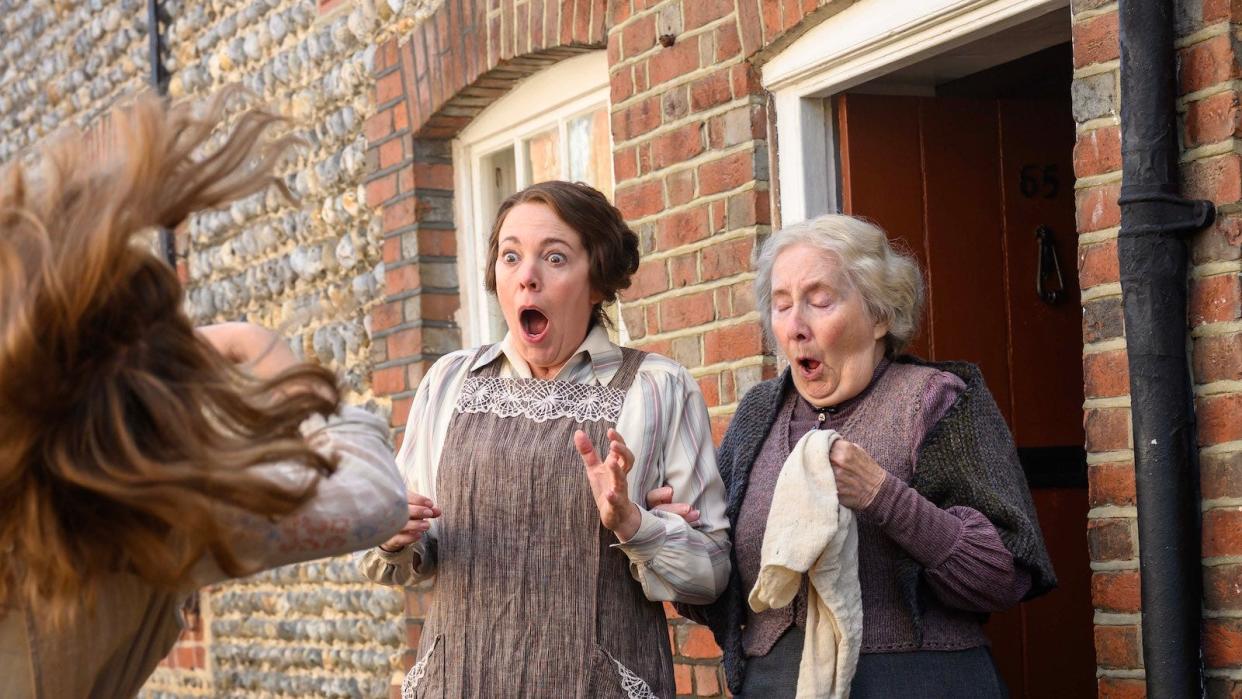'Wicked Little Letters' wants to learn from shameless scandal, but falls short

- Oops!Something went wrong.Please try again later.
It is not necessarily the fault of Thea Sharrock’s “Wicked Little Letters” that we currently live in a society without shame. For the film tells the mostly-true tale of a scandal that hit small-town England in the 1920s, where regular folks found themselves receiving anonymously-penned letters full of profanity and insults.
The whole United Kingdom was outraged then — now, we would call it another day on social media. Maybe even reward the bad behavior with a position of power and prominence. Even when the film uses its old-fashioned nature to make a point about modern life, "Wicked Little Letters" still misses its mark.
Edith Swan (Olivia Colman) is spinster who lives with her parents. She’s reserved but content. All is normal until Rose Gooding (Jessie Buckley) moves next door. Rose is crass and sexual and free-spirited.
Edith finds herself drawn to the new neighbor. Perhaps she just wants to be nice to the new person in town. Perhaps she gets a little thrill from Rose’s bad behavior. The friendship sours after a bit, and bad feelings bubble up. About this time, Edith starts receiving poison-penned letters in the mail that cause her all sorts of consternation.
The authorities are called. Rose is arrested for libel. A trial is scheduled.
Before Rose is bailed out, and while she’s locked up, the letters stop. When she is released, they start back up. All the evidence points to this naughty newcomer as the culprit. But the truth is more complicated than that.
Well, it’s not much more complicated than that — but I shall withhold certain plot points as to not spoil the surprise for anyone who cannot see the developments from a mile away. “Wicked Little Letters” is a film that’s not so much about the details of its story but about its message. About how women are treated by a buttoned-up community. Why people allow their dark side to run rampant when they think no one is watching or can find them out. When a criminal court system turns a blind eye when authorities “know” they have the right culprit in their sights.
“Wicked Little Letters” is just so quaint, considering it unleashes a flood of bad words throughout its run time. An arthouse crowd expecting prim and proper dialogue from the mouths of well-coifed British characters will get a charge out of hearing Oscar winners (and nominees) saying multiple variations of every f- and c-word you can imagine.
Mind you, these words are not funny as a general rule. They can be funny depending on the delivery. The incessant mugging of Colman and Buckley perhaps puts too fine a point on them. In other words, it didn’t do much for me, but comedy is subjective and maybe it will tickle you.
Or maybe I am desensitized. After all, I can watch any film or go to any social media site and be barraged with coarse insults. In fact, in our little progressive community, there’s a state senate candidate (and former state representative) who says things on his social media pages that would make your hair stand on end.
Not only is he considered an upright member of the community, leaders in his party urged him to run. Look it up. You’ll be more shocked by that than anything in “Wicked Little Letters.”
I am being unfair to the film. After all, this is a real scandal and a real moment in history filmmakers chose to recreate on celluloid at this moment in time. What are they wanting to say? What do they want me to take from the film? It seems the message is not that being foul and hateful is a bad thing. But rather being foul and hateful and anonymous is the problem.
One should be more like Rose, who trots her bad habits out into the public square for all to see. Her nasty attitude is loud and proud, the film suggests, and anyone who chooses to share the same thoughts in an unsigned letter is really just repressed and untrue to themselves. An odd message.
“Wicked Little Letters” also uses the time and location of the story as a way to feel morally superior to its characters. Women are treated as second-rate citizens by the menfolk in this town. Of course, women are treated so much better in modern times that we can have a good chuckle at the backward nature of the culture depicted in the film. You and I both know that, while we’ve made progress, we’re not out of the woods.
The one policewoman in town — Gladys Moss — receives a great deal of abuse. In a bit of color-blind casting, Gladys is played by Indian actress Anjana Vasan. While the effort is noble, it also seems strange to stay silent on an Indian character being treated poorly by an English community. There’s almost a bit too much history being ignored for that to work. Even the film’s good intentions get tripped up.
History can be tricky for a modern audience, and sometimes scandals don’t survive changing cultural mores. “Wicked Little Letters” wants you to get a laugh from the ridiculousness of it all while teaching you a lesson about contemporary time. I am afraid the film is too clumsy to do both.
James Owen is the Tribune’s film columnist. In real life, he is a lawyer and executive director of energy policy group Renew Missouri. A graduate of Drury University and the University of Kansas, he created Filmsnobs.com, where he co-hosts a podcast. He enjoyed an extended stint as an on-air film critic for KY3, the NBC affiliate in Springfield, and now regularly guests on Columbia radio station KFRU.
This article originally appeared on Columbia Daily Tribune: 'Wicked Little Letters' wants to learn from shameless scandal, but falls short

